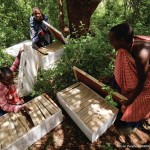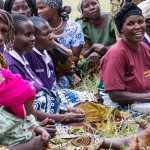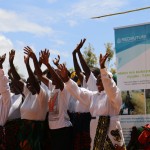Without a labor ward at the local health center, expectant mothers in Kibaigwa village had to be rushed 45 kilometers over dirt roads and harsh terrain to the neighboring district to give birth. All that changed, however, when locals teamed up with USAID and a local non-governmental organization to learn how to push for change at the grassroots level. Read how this humble group of villagers were able to petition their local government for a women's labor ward of their own after getting a feel for civic engagement.

Salome Mpongoliana was poor, lacked education, and had little control over her family’s finances. But when she joined a women’s group and discovered beekeeping, her fortunes began to change. Read how these women are linking profit and conservation as they pursue a new honey farming enterprise in their northern Tanzanian village.

As a teacher, farmer, and mother of three, sometimes it feels like the weight of the world is on Asela Valonge's shoulders. It’s not an uncommon feeling. In many cases, the average Tanzanian has yet to feel the impact of the country’s recent economic growth. Fortunately, Valonge's home region of Iringa is forging a new approach to development. Instead of relying on autonomously functioning programs to develop solutions, USAID activities in the region are pooling efforts and comparing notes, working in tandem to maximize impact for people like Valonge.

In many ways, Kinywang’anga is a typical Tanzanian village. Located in central Tanzania, it is home to quiet countryside and to hospitable locals, most of whom earn their living from the land. This small community, however, has big changes on the horizon. Whereas most rural Tanzanians lack the legal right to their land, residents of Kinywang’anga are, for the first time, claiming such a right to their land—and local women like Anita Mfilinge are benefitting as a result.
Being able to reach a health facility can spell the difference between life and death for millions of rural Tanzanians. Harsh terrain, lack of transportation, and punishing distances often stand in the way. Thanks to the power of mobile technology, however, things are starting to change. Read how one expectant mother was able to get to her district hospital for urgent care thanks to dedicated local health workers, a phone call, and a little innovation.








Comment
Make a general inquiry or suggest an improvement.